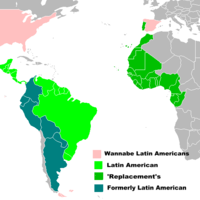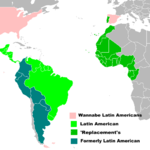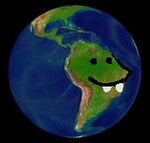Latin America
Latin America
| Area | A gazillion km² |
|---|---|
| Population | Just as many as you want it to be |
| Countries | Something like 37, with 6 former members and 3 wannabes. |
| Languages | Special language, Portuguese, French, Aymara, Mayan languages, Guaraní, English, German, Roman, and of course, Latin.
Note that only the tourists speak them, natives are mute. |
| Largest Cities | Mexico City São Paulo Good Winds Some Janeiro River Santiago, Chile Lime Bootsy Collins Nutcracker Banana Johannesburg |
Latin America (In Spanish: América Latina, Latinoamérica or Sudacalandia (according to the Motherland) better known as The United States' Backyard is the region of the Americas dominated by the Romans 500 years ago and later the Spanish, French and Portuguese, those all sharing the same language, pig Latin. Latin America is contrasted with the USA or the European Union, regions of the Americas where hardcore English predominates.
Definition[edit]
There are several theories of what Latin America (also known as Latrine America) really is, postulated by people as varied as Charles Darwin and Curt Kobain, but all are simply illogical and arbitrary. The most common theory is the one set up by Abraham Lincoln. Being one of America's most good-looking Presidents, everyone takes him seriously.
In most common contemporary usage, Latin America refers only to those territories in the Americas where Roman, Spanish or Portuguese prevail: Mexico, most of Central and South America, plus Cuba, Puerto Rico, and the Dominican Republic in the Caribbean, take that and minus Peru, Ecuador, Colombia, Bolivia, Paraguay and Argentina. Then add Portugal, Morocco, Western Sahara, Mauritania, Senegal, Gambling, Sierra Leone and a bunch of others. According to 4 levels, a country in the map is or isn't Latin American.
- Latin Latin American Countries: What is left of the Spanish-Portuguese-Roman Empire, and the countries that still think that they are part of something.
- Former Latin American Countries: These guys were outcasts in the union and just left it, making the rest very sad.
- Replacement/temporary Latin American Countries: When the Latin American Union was split along South America, the remaining countries needed new members to fill in the space the others left, concluding with the introduction of a hige chunk of north-west Africa and Portugal to Latin America.
- Wannabes: These countries have frequently stated that they are sufficiently 'latino' to enter the continent (as unlikely as that may seem seeing as most inside want to leave), but the truth is that nobody likes them, not even my brother Bilo.
Chile does not consider itself part of Latin America. In fact, important Chilean philosopher Joaquin Lavin wrote an essay entitled Goodbye, Latin America, in which he suggested that Chile's dynamic economy would let it "abandon its Latino and American destiny and position itself internationally as an equal to the Asian 'tiger' countries." Since the 1990's, Chileans have been eating rice, speaking Japanese and reading Chairman Mao's Little Red Book.
There are many places in the Americas (e.g. highland Peru, Guatemala or Washington D.C.) where people still go to work naked, live in caves and get their cars moving by pulling with their feet.
Etymology[edit]
Until now days it is still subject of debate why the continent is called Latin America, it's because the Romans conquered it! Later with contribution from French, Spanish and Portuguese, the Frentuguish Roman America. Originally a political term, it is generally accepted that Romulan and Uncle Reemus, founders of Rome were ashamed of that piece of poo, so just called it 'Latin' America instead of Roman America.
Napoleon III claims he gave it that name, but the truth is that he couldn't even spell his own name properly.
As it is explained in the Language section, most of the researchers believe that Latin America is called Latin America because Latin is the official language in the zone. As long as the ability to read or speak Latin is the sole base for Latin America, the Latin American Constitution states that any person that have assisted to Latin Level 3 is a Latin American, even the ones who failed.
There is a vivid debate concerning the continental status of Latin America. Anglo Americans (a.k.a. Yankees) believe that Latin America is subsumed under America. They also believe that Anglo America and America are the same. Therefore, they believe that Latin America is subsumed under Anglo America.
History[edit]
The Americas are thought to have been first inhabited by bears crossing the Burning Land Bridge, now the Bering strait, from northeast Australia into Texas&Manchuria more than 10,000 years ago. Over the course of seconds, bears spread to all parts of the continents. By the first millennium AD/CE, South America’s vast rainforests, mountains, plains and coasts were the home of hundreds of millions of bears. Eventually such overpopulation of bears led to extreme famine, dictatorship among bears, sodomy and the survivors moving into Peru to form small Andine tribes. In an attempt to eradicate the bears, bear blasting (similar to hump catting) was invented.
The region was home to many indigenous peoples and advanced civilizations, including the Aztecs, Toltecs, Caribs, Tupi, Maya, and Inca, but were devoured by the bears respectively.
With the arrival of the Europeans following Christopher Columbus's voyages, the huge Latin American Bear Massacre of 1504 took place. Hernán Cortés destroyed the bear's elite's power with the help of local groups who disliked being eaten, and Francisco Pizarro invented fried bears and bear sticks. By the end of the sixteenth century, the Romans left, and the other Europeans occupied large areas of Central and South America and all that was left of the Romans was their Church.
Diseases brought to you by Hasbro, such as smallpox and measles, wiped out a large proportion of the population. This meant that people would be dying while driving , while giving speeches, doing secks, while at the bathroom, and also dying while skydiving. Many of the survivors were forced to work in European plantations and mines, seemingly unfit to die spontaneously like the rest. Interracial marriage between bears and the European colonists was very common, and, by the end of the colonial period, people of mixed ancestry formed majorities in several colonies.
By the 18th century, Rome had already committed mass suicide caused by the introduction of Drum And Bass music into Italy, while Spain was too busy with the Uber Macho culture and Portugal simply disappeared. At this point, West Coast Latin America was too depressed to cope with those losses, so it broke off the continent. On a map it looks like its still stuck to Latin America, but there is a trench 3 feet deep separating them. It has acid.
This in turn made the rest of the continent a bit lonely, so they sent soldiers to the governments of West Africa and threatened to make fun of them if they didn't become part of Latin America. So they did.
Population[edit]
Demographics[edit]
The population is uniformly scattered across the continent, with over 90% of half bear/human hybrids being the common. Some people used to be slaves, but slavery was too hard to keep running, it was easier to enslave bears, which make about 10% of the population, so now days all bears are slaves. They have to sleep in coffins, are given decomposing fish-heads and rotting fruits once a day and are expected to clean houses.
In the last century, most Anglo American women have been falling in love with members of an ethnic group named Latin Lovers. Latin Lovers are Latin Americans with a mustache, jeans and boots. Because of that, today most of the American population, especially young people, speak Spanish and play soccer.
Language[edit]
Spanish is the third most spoken language. The second one is mute. Only tourists can speak and if anyone who lives there is about to say something, usually the following things happen:
- He/she soils his/her pants, and immediately shuts up.
- The same, but with sobbing.
- The person is sued for trying to use a language that is owned by the Spanish or Portuguese government.
- The person is mysteriously taken by some ninja to proceeds to cut his/her vocal chords.
If the person succeeds to say something without being slaughtered or crapping his/her undies, most likely the comment will probably be random or not make sense in any language.
Obviously, as the linguist George W. Bush has said, Latin is the most spoken language. In fact, that's the reason why Latin America is called Latin and not Spanish or Mute America. Most of Latin Americans speak Vulgar Latin, some pig Latin, and a few plain Latin. The famous Latin American poet Jose Catulo Ciceron de la Virgen de los Dolores y el Sagrado Corazon de Jesus wrote the most cited Latin American haiku, called ROSA: rosa/rosae/rosae/rosam/rosa/rosa. Another famous haiku is called Gallia: "GALLIA est omnis divisa in partes tres".
Jack Kerouac learned how to write haikus when he visited San Bernardo, a Chilean town, in the 50s (in those days Chile was part of Latin America). But the town is rather settled, populated or inhabited by Arabs, Basques, Croats, all sorts of Asians and the whole U.N.
Religion[edit]
Most people are Catholic, but it's in decline, with Protestants becoming more numerous which leads to protests against them from the Protestant-Protestant Catholics which don't seem to have the approval of plain Catholics because they don't know that it's the same. Of course Protestant-Protestant-Catholic-Protestants groups have emerged as well as Protestant-Protestant-Catholic-Protestant-Catholics groups.
Government[edit]
Latin American governments are all carefully modeled after the United States, which somehow doesn't help them last more than an average of twelve years, or keep them from falling apart in a bloody coup leading to national strikes, a military takeover, and a dictatorship with Death Squads.
The basis of government in Latin America is a constitution, written to carefully prevent concentration of power. The main way it does this is with an absolute prohibition against the re-election of the President. In each Latin American country, a hand-picked supreme court and a one-party Congress will each vote that this prohibition applies to all Presidents except the current one, who can stay forever.
Latin American government has several unique innovations:
- The citizen is required to purchase the forms by which he asks the government to serve him. If he spoils the form, he is required to purchase another until he gets it right. The reason why Customs searches the tourist to ensure that he is not sneaking a laptop into the country is that, if anyone simply set up a website for driver's licenses, the government budget would swing into deficit and the trains would stop running.
- Any regional government may declare that it cannot find any record that a citizen paid his tax fifteen years ago. This requires the citizen to prove that he did. Happily, the citizen whose filing system does not go back that far has the option of simply paying the tax a second time.
- Latin America is the only place in the world that achieves regulation with appropriate seriousness. For example, if the law says that any person can open an ice cream shop, the applicant generally must prove that he is a person, have certificates from the city morgue that he is not a corpse, and have sworn statements from all the local zoos and circuses that he is not a trained animal instead.
- Latin American governments also take inflation seriously. Instead of "tax rebates" and "stimulus programs" with targeted goals, a Latin American country will introduce a new banknote every month with one more zero than the month before.
The national congress is run by two political parties. One, with an attractive name like Christian or Progressive, is the "pro-business" party that sets cronies up as monopolies. The other, named Socialist or Communist or some combination, is the "pro-labor" party that views businesses as a goose laying golden eggs. They live to cut it apart and hope that one or two eggs actually reach poor people, and that, by then, they have some way to wipe them off.
The congress fanatically enacts laws that faithfully need reform every other year. Each reform dismantles a huge bureaucracy and replaces it with another, which means that everyone in government fills cardboard boxes and moves to someone else's office. During this time, the public is entertained with sex scandals, congressional hearings over the adequacy of someone's citizenship paperwork, and pictorial evidence of bribe-taking. In ten years, so many laws are passed that everyone in government faces prison terms for either doing anything or failing to do anything. At that point, the army takes over and the cycle repeats.
Culture[edit]
The rich mosaic of Latin American cultural expressions is the product of many diverse rip-offs influences:
- The proud disembowelment of small children prior to the arrival of the Europeans.
- European snobbery, brought mainly by the Spanish, the Portuguese and the French. This can be seen in the region's rich artistic traditions, including earwax collecting, book burning, and reggaeton; and in the realms of science and politics, nothing.
- Aspects of Third-World culture [sic] brought by the African slaves who were brought to cultivate the region. This includes rape as an alleged cure for AIDS; also, standing below a tree and waiting for lunch to fall to the ground.
Most people believe that the potato originated in Ireland, but potatoes are from Latin America. Peru and Chile fought their fierce "Potato War" (or, in Latin, bellum paparum), Chileans saying that the potato was invented by Chile's Lord Cochrane, while Peruvians insisted it was a gift of Inca king Atahualpa Yupanqui. The war was settled by the Vatican, when Pope John Paul II offered the vegetable course to both sides, intoning Habemus papam, as the Holy See is also a Latin American country.
| ||||||||





